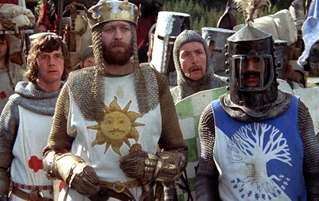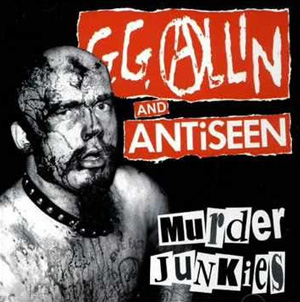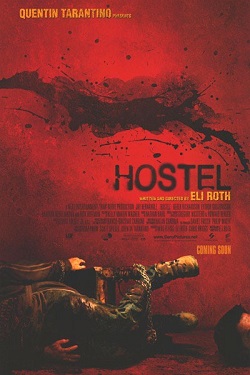6 Completely Ridiculous Ways Famous Movies Paid The Bills

Movies, even the small ones, are expensive. Today, when a plucky new filmmaker gets rejected by the studio system, they can turn to crowdfunding sites like Kickstarter to raise the capital they need to bring their dreams to (usually terrible) life. However, in the days before Indiegogo, some now-famous directors got the money they needed for their breakout films in less conventional ways. Like posing as the opposite gender in a sex chat room, or driving around delivering medical care for cash.
The Director Of The Hangover Funded His First Film With The Help Of A Notorious Serial Killer

Todd Phillips' biggest claim to fame is his role as the director of The Hangover, The Hangover 2: Just In A Different Country, and The Hangover 3: Ken Jeong Didn't Get Enough Screen Time Earlier. But long before he rode Bradley Cooper's broad shoulders into the spotlight, he was a regular old broke NYU film student in the early 1990s. As a junior, Phillips started making a documentary about underground punk rocker GG Allin, best known for cutting himself on stage and showering his performances with bodily fluids.

Phillips had managed to score a few hours' worth of interview time with Allin, and had exclusive footage to help him document the story, but still needed about $10,000 to make the movie happen. Unfortunately, financiers weren't lining up to give some random college kid money to make a movie about an infamous, self-destructive maniac.
Allin, as luck would have it, was good buddies with an artist who could fetch Picasso-like prices for his scribbles. Phillips and Allin reasoned that if they could convince the guy to design a poster for their film, they could maybe sell enough of them to pay for the rest of the documentary. The only tiny obstacle was that this artistic savior was on death row in the state of Illinois. His name was John Wayne Gacy. As in, "killed over 30 people" John Wayne Gacy.

Taking what must have been the world's deepest breath, Phillips wrote to Gacy in prison and asked if he'd design the poster for this film about GG Allin that he wasn't even close to finishing. Perhaps unsurprisingly, Gacy agreed to do it for "$50, for art supplies in jail, and a compromising photo of ." Phillips took what he describes as a "hawkish" photo on the roof of his apartment building and mailed it along with $50 to Gacy, who in turn designed the poster for Hated: GG Allin And The Murder Junkies. You're gonna Google it anyway, so here it is:

Gacy signed copies of the poster, they sold like hotcakes (if hotcakes sold for $12,000), and now Phillips makes comedies about middle-aged men acting like teenagers.
Stanley Kubrick Paid For His First Movie By Hustling Chess Games

Every game that can be played for money has hustlers, but the people who hustle chess can be particularly sleazy. It's a game of strategy, so they'll use strategies like making your clock run faster to rip you off. Ever wondered what they do with that cash, though? Well, in the case of one chess hustler named Stanley Kubrick who operated in New York City in the '50s, the answer is "Make classic movies that will be studied for centuries."

Kubrick's dad had originally taught him chess to keep his brain sharp, but Li'l Stanley figured out its swindling possibilities early on. He began playing chess for cash at a young age, and when he dropped out of school at 16 to become a professional photographer, chess hustling seemed like a reasonable way to get by. It's like that Paul Newman movie The Hustler, only for nerdy, antisocial children.
To double down on the whole "not having a real job" thing, Kubrick would also collect unemployment while making at least $3 a day fleecing his fellow chess players -- back when the minimum wage was only about 40 cents per hour. Kubrick was reportedly an expert at making other players think he wasn't an expert (which couldn't have been that hard, considering he was a kid and all), and then kicking their asses. He would also carefully time his matches to switch tables at strategic hours, allowing him to play under the shadow during the day and near the street lamps at night. Even back then, he was obsessed with getting the lighting just right.

At first, Kubrick would use the money to buy essential stuff, like food and movie tickets. When he decided to make a feature-length film of his own, though, he financed it in part with chess-hustling cash. The result was Fear And Desire, a psychological wartime thriller which probably mirrored the terror and confusion experienced by numerous chess players who got crushed by a 20-something weirdo artfully positioning his gaming chair in the shadows.
Eli Roth Worked As A "Woman" In Erotic Penthouse Chat Rooms

Eli Roth is best known for the Hostel series and for killing Hitler in Quentin Tarantino's Inglourious Basterds. What he should be known for, though, is for secretly being a pioneer of cybersex this whole time.
To quote Roth himself: "When I was in college, I used to work as an online operator for Penthouse, posing as a woman called Tami. That's how I paid for my student films. They hired guys because guys know what other guys want to hear." And it seems that what other guys want to hear is the Bear Jew whispering sensually in their ears.

It's important to note that this was in the early '90s, before everyone had tiny computers you can use to go online while pooping, so it's not like Roth was catering to a broad audience. His main interactions were with scientists, doctors, and real computer nerds, who were probably busy designing the future in mobile technology (with one hand). Today, a whole bunch of middle-aged tech workers probably have no idea that they accidentally masturbated to a torture porn director before the dawn of Google Images and TMZ.
What's really impressive is that the guys Roth worked with could make some serious bank. He claims that while he was never FedExed money by horny suitors like some of his co-workers, his clients were paying a dollar a minute or more to talk to "Tami."

This at least sheds some light on the time Roth had a cyber-orgy with a bunch of Twitter fans. Either he was feeling nostalgic about his old work, or he needed to raise some quick cash for his next movie.
Mad Max Was Financed With Emergency House Calls

The Mad Max films really hammer home the realities of a lawless dystopia. What would happen if there was no access to basic human needs like food, water, and healthcare? Director George Miller would have a pretty good idea, because he was a doctor in Australia in the '70s.

For whatever reason, saving lives was just not enough excitement for Miller. He started taking some film classes on the side to keep himself occupied. There, he met his future producer, Byron Kennedy. After working on some small projects together, they decided to start trying to make it big. They knew that Australia had a government agency set up for funding films, but they weren't confident that they could secure money for an apocalyptic action movie based primarily around fast cars blazing around in the desert. (The "Fast Cars Blazing Around In The Desert Fund" wouldn't open until 1992.)
And so, turning into something of a Mad Max duo themselves, Miller and Kennedy set about doing some after-hours medical work in order to raise funds for their film. Kennedy would drive Miller around so that Miller (being a doctor) could make emergency house calls. It's kind of difficult to imagine what sort of shit he treated that was so bad that people didn't want to go to a damn hospital, but he did it anyway.

The "ambulance" didn't inspire a lot of confidence, but you gotta work with what you have.
Miller and Kennedy worked at this for several months, all the while ironing out their script for Mad Max (which itself was inspired by the horrific car wreck injuries Miller had seen while working at the ER). They eventually saved up around $350,000, which was somehow enough to cover all the spectacular crashes required to make the film. So it looks like the easiest way to become a successful filmmaker is to go to medical school.
Monty Python's Movies Were Funded Entirely By British Rock Stars

The bizarre, occasionally incendiary, and wildly experimental films of Monty Python are largely considered to be comedy classics. Which is interesting, because at the time, fucking no one wanted to pay for them. Despite coming off of a popular TV show when they set about making Monty Python And The Holy Grail in 1975, dredging up funding was proving difficult. According to co-director Terry Gilliam, "there was no studio interference because there was no studio; none of them would give us any money."

That's when salvation came in the form of their own personal Live Aid charity: 10 different rock groups, including Pink Floyd, Led Zeppelin, Genesis, Elton John, and half of The Beatles, gave $10,000 each to make the movie happen. Whether they did it for the tax breaks (as Gilliam suggests) or because they really liked the show, it's still admirable that they all came together to finance a movie which had been deemed so silly that it was not allowed to be shot at any real castles.
Holy Grail earned a decent percentage return on its budget, but the Python crew knew that for their next film, they should probably try to tackle a subject that wouldn't make studio executives so gun-shy. This is another way of saying that they made a musical comedy about Jesus.

Funding for Monty Python's Life Of Brian proved just as difficult, which meant the Pythons had to turn to their previous source of revenue: rich musicians with a sense of humor. However, this time, ex-Beatle George Harrison fronted all the money himself. Harrison actually mortgaged his house in order to provide the funds for Handmade Films, the production company behind Life Of Brian. Why the hell would he do that? According to Python's Michael Palin, Harrison told him, "Well, I wanted to see the film." Presumably while his wallet gently wept.
The Exorcist Was Funded By The Author's Borat-Like Appearance On A Game Show

The Exorcist, the gruesome story of a possessed young girl which was adapted into one of the biggest horror films of all time, began in an amazingly silly way: on Groucho Marx's game show.
Before becoming famous, the book's author (and also the film's Academy-Award-winning scriptwriter), William Peter Blatty, had this shtick where he would pose as an Arab prince and crash Hollywood parties. What started as research for an article titled "I Was An Arab Prince" became a ridiculous year-long project, culminating with a visit to Groucho's game show You Bet Your Life. Among other things, Blatty claimed that he wasn't sure if he had 30 or 40 brothers, and he said his name was "Prince Xeer," which the general public accepted as comedy back in those days.


Blatty claims that Groucho knew his real identity all along, but that didn't make things any less strange. In reality, Blatty was a publicity director at the University of Southern California, which was apparently a decent enough job, seeing as it allowed him to know which parties he could crash while dressed as a Saudi prince.
The game went on, and Blatty was asked what he was going to do with the $10,000 prize, which he had to divide with another winner (and then again between himself and his split personality). Blatty's answer? He was going to write a famous novel. After taking off with his five grand -- about $41,000 in 2016 money -- Blatty quit his job and focused on his writing career, eventually leading to The Exorcist in 1971. So who knows, maybe the creepiest novel of this century will be written by Sanjaya from American Idol.
What's The Best Fictional School To Attend? In the muggle world, we're not given the opportunity for a magical hat to tell us which school we should go to. Usually we just have to go to the high school closest to where we live or whatever college accepts our SAT scores and personal essay. This month, our goal is to determine what would be the best fictional school to go to. Join Jack, Daniel, and the rest of the Cracked staff, along with comedians Brandie Posey and Steven Wilber, as they figure out if it's a realistic school like Degrassi or West Beverly High, or an institution from a fantasy world like Hogwarts with its ghosts and dementors, or Bayside High, haunted by a monster known only to humans as Screech. Get your tickets here!
Also check out The 5 Worst Kickstarter Ideas That Actually Got Funded and 6 Spectacularly Embarrassing Celebrity Kickstarter Fails.
Subscribe to our YouTube channel, and check out Why Kickstarter Is Not The Future Of Movies, and other videos you won't see on the site!
Also, follow us on Facebook, and we'll follow you everywhere.
